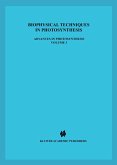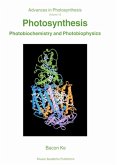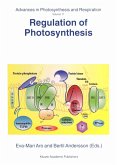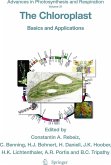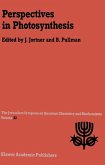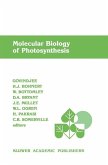Dieser Download kann aus rechtlichen Gründen nur mit Rechnungsadresse in A, B, BG, CY, CZ, D, DK, EW, E, FIN, F, GR, HR, H, IRL, I, LT, L, LR, M, NL, PL, P, R, S, SLO, SK ausgeliefert werden.
"One of the great attributes of this book is that it gives the reader a strong sense of belonging to a new era ushered in by profoundly interesting advances in technology with an abundance of ideas of how these innovations may be applied to important problems not only in photosynthesis, but in many other bio-related fields as well." (Harry Frank, Professor, University of Connecticut, Storrs, CT, USA)
"The excellent comprehensive treatment of novel techniques is found in Volume II of Biophysical Techniques in Photosynthesis (written by prominent experts in the field).... it will prove invaluable not only to scientists and students in photosynthesis research but also to those interested in all other areas where advanced imaging methods are applied, in crystallography, physical properties and macro-organization of membrane proteins, in femtochemistry and femtobiology and, even in material sciences involving solar energy research and technologies." (Gyõzõ Garab, Professor, Biological Center, Szeged, Hungary)
"... Particularly striking is the intimate relationship, present in every chapter of the book, between structure, experimental methods and theory as a strong driving force for innovation and new knowledge. By focusing on new developments and techniques, this book is highly complementary to the first volume on this topic, published in 1996 and edited by the late Arnold J. Hoff and Jan Amesz. Just like the first volume, this book will be of great value to researchers in the field of photosynthesis and beyond, students and scientists alike, as an introduction and reference to state-of-the-art biophysical techniques." (Wolfgang Lubitz, Professor, Director Max Planck Institute for Bioinorganic Chemistry, Mülheim an der Ruhr, Germany)
"The reviewed book, volume 26 of the series, consists of twenty four chapters that describe the most modern procedures and apparatuses used for biophysical research inphotosynthesis. ... As is usual in this book series, 13 figures in colour are presented on seven plates ... in addition to their black-and-white printing in the respective chapters. ... Books describing methods applicable in the field of photosynthesis are always welcome by students and researchers. Certainly also this new book will be frequently used and often cited." (Z. Sesták, Photosynthetica, Vol. 46 (2), 2008)
"'Biophysical Techniques in Photosynthesis II' ... brings about new developments in the biophysical tools and techniques, and how they could reveal the finer and deeper details of the mechanism of photosynthesis. ... All the contributors have done excellent job. ... strongly recommends that departments, colleges, universities and institutes (traditional and professionals) should have copies of this valuable book on biophysical techniques." (Prasanna Mohanty, Indian Journal of Biochemistry and Biophysics, Vol. 45, October, 2008)
"Biophysical Techniques in Photosynthesis-II, which elegantly describes how many novel biophysical methods and techniques have emerged and evolved to study bacterial, algal and plant photosynthesis. ... Students of interdisciplinary programmes would immensely benefit from such a reference book that contains a large list of recent publications. ... I recommend this book to all those interested in plant and crop sciences, microbiology and environmental sciences. ... the book should be at the desk of the researchers." (Prasanna Mohanty, Physiological and Molecular Biology of Plants, Vol. 14 (4), October, 2008)



